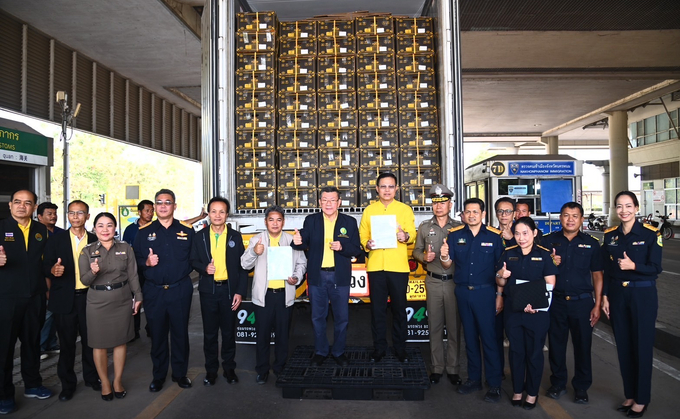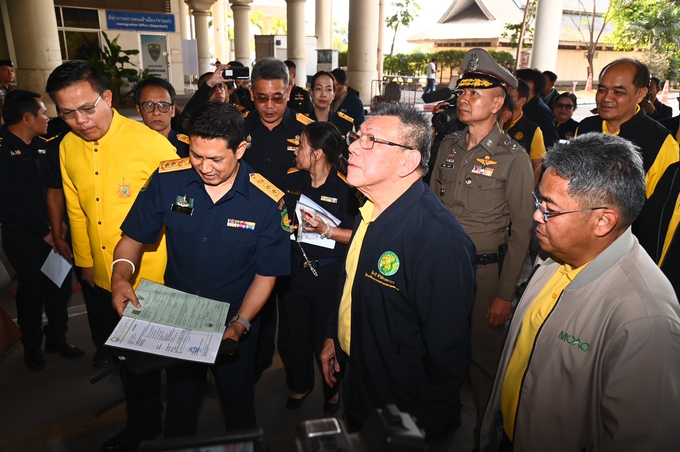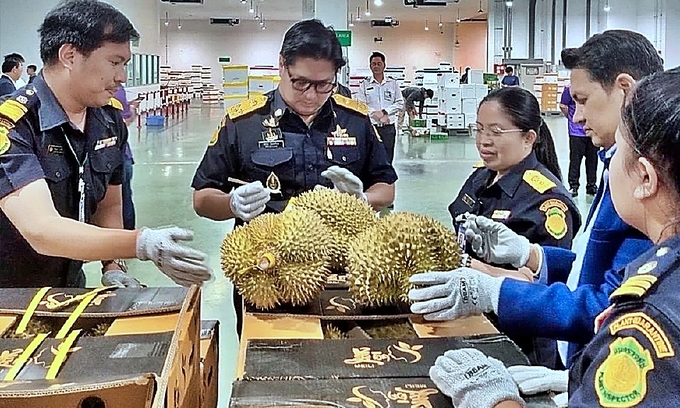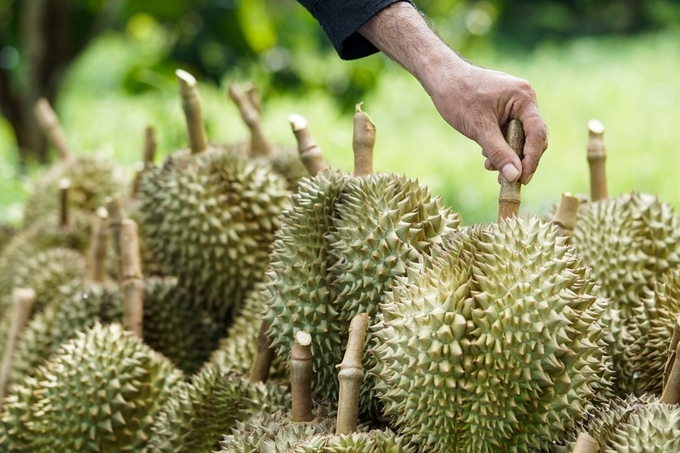Source: Nongnghiep.vn

Thai durian was exported back to China from the beginning of this week. Image: RTG.
Be ready to prosecute violating establishments
The Thai Government Information Portal announced that the country has exported durian again to China. On Monday and Tuesday of this week (January 20-21), about 96 tons of durian, worth 7.8 million baht (about 60 billion VND) were cleared at Nakhon Phanom border gate. In addition, there are about 45 more tons of durian waiting for final procedures to be exported from Suvarnabhumi airport.
Thus, since China applied strict inspection measures on durian, Thailand needs about 10 days to clear customs again.
“The Ministry of Agriculture and Cooperatives did not sit still after China had new requirements for durian. I would like to praise the relevant units for joining hands to make Thai durian number 1 in the world,” Deputy Minister Itthi Sirilatthayakorn declared and committed that the Ministry will support all measures to help trade partners increase their productivity. belief in Thai durian.
Mr. Itthi also emphasized that all products, including durian, must be absolutely safe, ensure hygiene, quality, and do not contain chemical residues that can harm human health. If manufacturers do not comply with this regulation, they face many penalties, including damage to Thailand’s reputation.
“We will revoke the codes of growing areas and packaging facilities immediately, and even consider the possibility of prosecution if we detect violations,” said the leader of the Thai Ministry of Agriculture and Cooperatives.

Deputy Minister Itthi Sirilatthayakorn (top row, two from the right) directly inspected the durian customs clearance situation at Nakhon Phanom border gate. Image: RTG.
In early January 2025, the General Administration of Customs of China (GACC) discovered that some Thai durian shipments had yellow O residue (also known as Auramine O, or Basic Yellow 2 – BY2). On January 10, China announced the application of strict measures on imported durian, including products originating from Thailand.
To ensure this, Director General of the General Department of Agriculture Rapeephat Chandrasriwong requires durian production, purchasing, pre-processing and packaging establishments to absolutely comply with the “4 Nos” principle. That is: the peel is not crushed, does not contain harmful organisms according to Chinese requirements, does not impersonate the growing area code and does not contain banned substances.
Durian festival in Eastern Thailand will take place on January 25. Therefore, overcoming problems related to gold O also aims to ensure people’s livelihoods, according to Mr. Rapeephat.

Director General Rapeephat Chandrasriwong (from the left) directly took samples for testing of durian at the Suvarnabhumi airport area. Image: The Nation.
Investigation on the origin of yellow O residue on durian and leaves Bangkok Post said that since September 2024, the Thai Ministry of Agriculture and Cooperatives has discovered a number of individuals illegally using substances containing gold O on plants but have not been approved by the Food and Drug Administration (FDA). ), the Ministry of Public Health of Thailand registered and authorized circulation.
This substance was later used by some durian packaging factories, mainly in Chumphon province. Immediately upon discovery, the Thai FDA asked the business to stop using substances containing yellow O. However, during an inspection 1 month later, the FDA discovered that the facilities continued to use banned substances and decided to warn them. .
However, on January 11 (1 day after China issued a notice requesting gold O inspection certificate), a batch of Thai durians were refused entry at Nanning airport, China.
Mr. Thangon Pariwat, advisor to the Thai Fruit Trade Association, agreed that there needs to be measures to quickly improve durian quality, as well as protect the health of consumers.
“Durian producers and exporters and management agencies must accept this request and quickly find a solution, without disrupting trade, especially when Chanthaburi province is already in harvest season,” he said. . The consultant also recommended that Chanthaburi province should soon build a laboratory to test heavy metals (including gold O).

Durian is Thailand’s main fruit exported to China. Image: Thaigov.
In the long term, he suggested that the Ministry of Agriculture and Cooperatives send officials to inspect, analyze, and take samples of durian in export areas, right at the beginning of the season. The reason is that people in some remote areas may not fully understand the requirements of the import market, and the possibility of “inadvertent violation” cannot be ruled out.
“In the face of difficulties, we should join hands, instead of blaming. Whether we are management agencies, businesses or people, we all need to be deeply aware of this story to avoid its recurrence,” Mr. Thangon shared, noting that import markets like China are always closely follow Thailand’s production developments. It is the manufacturer’s duty, therefore, to comply with regulations and maintain all standards.
Deputy Minister of Agriculture and Cooperatives Itthi agreed and revealed that 4 more laboratories will be opened next week, helping to increase Thailand’s testing capacity to 1,300 samples per day. The entire amount of durian off-season, grown mainly in the Eastern and Southern provinces of Thailand, can benefit from this system.
In 2024, Thailand’s durian exports to China will decline due to heat and drought. After the first 11 months of the year, this country’s exports decreased by 8.2% compared to the same period in 2023. Besides, Thai durian also faces fierce competition from Vietnam and Malaysia.
Sheet Thairath said that many individuals still believe that dipping durian into a solution containing gold O will increase the yellowness of the fruit’s skin, making the color brighter and attracting buyers. In addition, some others consider gold O to be a “miracle drug” that repairs defects on the surface of the durian peel, helping to overcome problems on the peel such as fading, cracking, or crushed spines.
Many countries have banned the use of gold O on food or agricultural products. This substance can cause cancer, irritation of the digestive and respiratory systems, or some other abnormalities. Besides, yellow O is difficult to wash off, so it can stay on the shell for a long time and penetrate the rice inside.
